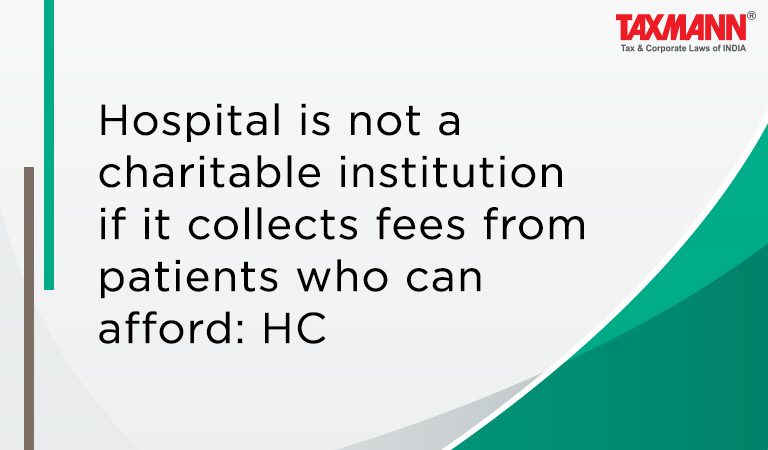Hospital is not a charitable institution if it collects fees from patients who can afford: HC
- Blog|News|Income Tax|
- 2 Min Read
- By Taxmann
- |
- Last Updated on 26 April, 2022

Case Details: Institute of Franciscan Missionaries of Mary v. Commissioner - [2022] 137 taxmann.com 378 (Madras)
Judiciary and Counsel Details
-
- C. Saravanan, J.
- Xavier Arul Raj, Sr. Counsel for the Petitioner.
- S. Saravanan for the Respondent.
Facts of the Case
Petitioner challenged the order passed by the Commissioner rejecting exemption from payment of property tax under Coimbatore City Municipal Corporation Act, 1981.
The Commissioner rejected the exemption by contending that the petitioner was collecting fees for treating patients and, therefore, it couldn’t be held as a charitable hospital.
Petitioner filed a writ petition before the Madras High Court, contending that profit earning should not be the dominant object of the charitable institution. It provided free treatment for a few poor and needy patients while collecting fees from those who could afford it.
It also drew attention that the word ‘charitable hospital’ isn’t defined under the Coimbatore City Municipal Corporation Act. Thus, the certificate of registration granted under Section 12A of the Income Tax Act is to be recognised for the purpose of grant of exemption under the Corporation Act.
High Court Held
The Madras High Court held that merely because the petitioner had certain outreach programmes that may be charitable or that a section of patients are given free treatment would not automatically render it a charitable hospital. It would not mean that an exemption from payment of property tax can be allowed to the petitioner.
The petitioner submitted no records to prove that the income tax department has allowed exemption under Section 11 to it. It had merely filed a copy of a letter certifying that an application in the Form-10A was made before the Commissioner of Income Tax.
If the amount is collected for treating the patients and a portion of the amount is used for doing charity, it would not mean that the hospital becomes a charitable hospital. There cannot be any discrimination between different persons who visit the hospital for treatment. There also cannot be different facilities for those who pay and those who do not pay. If such discrimination exists, it cannot be said a hospital was a charitable hospital.
Thus, unless the petitioner’s activities are entirely charitable in nature, i.e. there is no collection of any fees for the treatment given to the patients, the question of granting exemption under the Coimbatore City Municipal Corporation Act, 1981 cannot be countenanced.
Disclaimer: The content/information published on the website is only for general information of the user and shall not be construed as legal advice. While the Taxmann has exercised reasonable efforts to ensure the veracity of information/content published, Taxmann shall be under no liability in any manner whatsoever for incorrect information, if any.

Taxmann Publications has a dedicated in-house Research & Editorial Team. This team consists of a team of Chartered Accountants, Company Secretaries, and Lawyers. This team works under the guidance and supervision of editor-in-chief Mr Rakesh Bhargava.
The Research and Editorial Team is responsible for developing reliable and accurate content for the readers. The team follows the six-sigma approach to achieve the benchmark of zero error in its publications and research platforms. The team ensures that the following publication guidelines are thoroughly followed while developing the content:
- The statutory material is obtained only from the authorized and reliable sources
- All the latest developments in the judicial and legislative fields are covered
- Prepare the analytical write-ups on current, controversial, and important issues to help the readers to understand the concept and its implications
- Every content published by Taxmann is complete, accurate and lucid
- All evidence-based statements are supported with proper reference to Section, Circular No., Notification No. or citations
- The golden rules of grammar, style and consistency are thoroughly followed
- Font and size that’s easy to read and remain consistent across all imprint and digital publications are applied



 CA | CS | CMA
CA | CS | CMA
